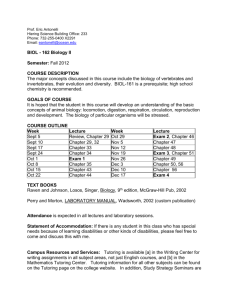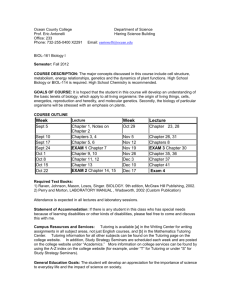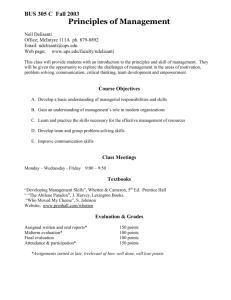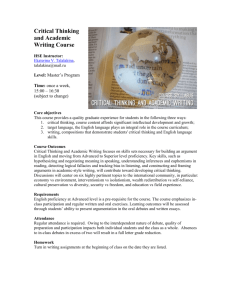REASONING AND CRITICAL THINKING (Phil 206)
advertisement
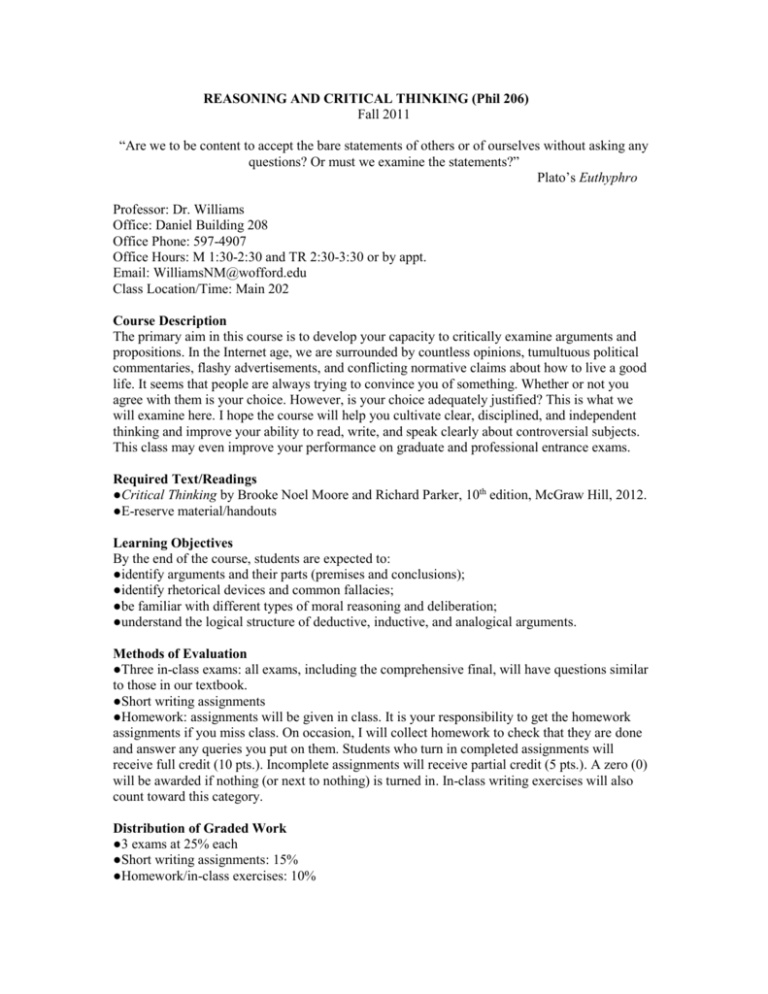
REASONING AND CRITICAL THINKING (Phil 206) Fall 2011 “Are we to be content to accept the bare statements of others or of ourselves without asking any questions? Or must we examine the statements?” Plato’s Euthyphro Professor: Dr. Williams Office: Daniel Building 208 Office Phone: 597-4907 Office Hours: M 1:30-2:30 and TR 2:30-3:30 or by appt. Email: WilliamsNM@wofford.edu Class Location/Time: Main 202 Course Description The primary aim in this course is to develop your capacity to critically examine arguments and propositions. In the Internet age, we are surrounded by countless opinions, tumultuous political commentaries, flashy advertisements, and conflicting normative claims about how to live a good life. It seems that people are always trying to convince you of something. Whether or not you agree with them is your choice. However, is your choice adequately justified? This is what we will examine here. I hope the course will help you cultivate clear, disciplined, and independent thinking and improve your ability to read, write, and speak clearly about controversial subjects. This class may even improve your performance on graduate and professional entrance exams. Required Text/Readings ●Critical Thinking by Brooke Noel Moore and Richard Parker, 10th edition, McGraw Hill, 2012. ●E-reserve material/handouts Learning Objectives By the end of the course, students are expected to: ●identify arguments and their parts (premises and conclusions); ●identify rhetorical devices and common fallacies; ●be familiar with different types of moral reasoning and deliberation; ●understand the logical structure of deductive, inductive, and analogical arguments. Methods of Evaluation ●Three in-class exams: all exams, including the comprehensive final, will have questions similar to those in our textbook. ●Short writing assignments ●Homework: assignments will be given in class. It is your responsibility to get the homework assignments if you miss class. On occasion, I will collect homework to check that they are done and answer any queries you put on them. Students who turn in completed assignments will receive full credit (10 pts.). Incomplete assignments will receive partial credit (5 pts.). A zero (0) will be awarded if nothing (or next to nothing) is turned in. In-class writing exercises will also count toward this category. Distribution of Graded Work ●3 exams at 25% each ●Short writing assignments: 15% ●Homework/in-class exercises: 10% Grading Scale (percentage) A =100-94; A- = 93-90; B+ = 89-87; B =86-84; B- =83-80; C+ = 79-77; C =76-74; C- =73-70; D =69-60; F =below 60 Preparedness and Participation Critical thinking cannot be crammed, memorized, or improvised. As with many other skills, the skills needed to think critically must be practiced on a regular basis. Thus, completing the assigned exercises in a timely manner is an integral part of the course and a key component for earning a high grade. When I call on you to answer a homework exercise question you should be fully prepared to offer a thoughtful response. With a certain amount of dedication on your part, this course should be interesting, broadening, useful and even fun. If you are working hard and still having trouble with the material, please make an appointment with me outside of class. The process of learning to think critically can be difficult, but I am here to help you succeed. Late Work/Missed Tests All work is due at the beginning of class. If you are absent on a day I collect homework exercises you cannot make up the work. If you know in advance that you will not be attending class when an exam is scheduled you must see me as soon as possible so that we can make arrangements for a make up exam. If I don’t hear from you by the next class period you will have forfeited the exam. Attendance Attendance is required in this class. You are allowed three absences with no grade reduction, thereafter three points off your final grade for every unexcused absence. I will record attendance at every class meeting. You are required to arrive at class on time and remain for the entire period in order to be counted as present. I have the right to drop you from the course in the event of excessive absences. Academic Honesty Academic dishonesty will be handed in accordance to Wofford’s honor code, which can be found at http://www.wofford.edu/studentlife/honor_code.pdf . Disability If you have a disability that requires my attention please let me know as soon as possible so that I may accommodate you. READING SCHEDULE (subject to change) Week 1 – Sept. 5 Introduction Chapter 1: Critical Thinking Basics Week 2 – Sept. 12 Chapter 2: Two Kinds of Reasoning Handout: Valid Argument Patterns Week 3 – Sept. 19 Chapter 3: Clear Thinking, Critical Thinking, and Clear Writing Week 4 – Sept. 26 Chapter 4: Credibility -2- Week 5 – Oct. 3 Chap. 4/ exam review Exam #1 Week 6 – Oct. 10 Chapter 5: Persuasion through Rhetoric Week 7 – Oct. 17 (Fall Break – Oct 21) Chapter 6: More Rhetorical Devices Week 8– Oct. 24 Chapter 7: More Fallacies Week 9 – Oct. 31 Chapter 7/catch up Week 10 – Nov. 7 Exam #2 Chapter 10: Three kinds of Inductive Arguments (pp. 346-358) E-reserve: Judith Thomson’s “A Defense of Abortion” Short writing assignment (argument questionnaire) Week 11 – Nov. 14 Short writing assignment (analogical argument) Chapter 10 Week 12 – Nov. 21 (Thanksgiving Holiday) Chapter 12: Moral and Legal Reasoning (pp. 436-459) Week 13 – Nov. 28 Chapter 12 Short writing assignment (moral reasoning) Week 14 – Dec. 5 Short writing assignment (editorial) Student presentations Exam #3-Comprehensive final: TBA -3-


